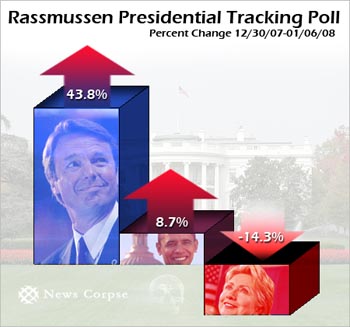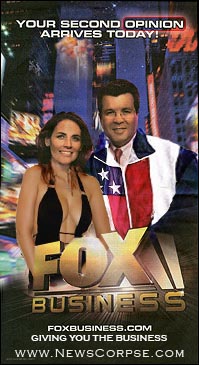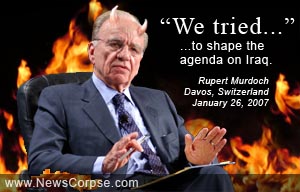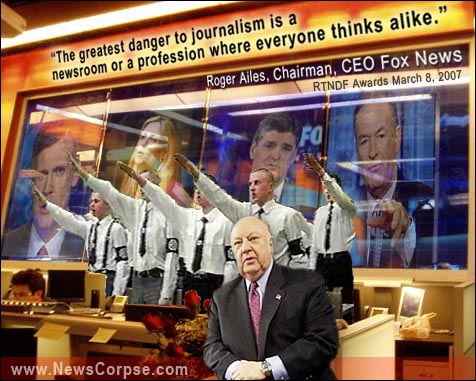A picture sometimes really is worth a thousand words…
 |
Rassmussen conducts a daily national tracking poll of all presidential candidates. The latest shows John Edwards picking up significantly more support, since the beginning of the year, than any candidate of either party.
The percent change for Republicans is: Huckabee 18.8% / Giuliani 13.3% / McCain 11.8% / Thompson 8.3% / Romney -6.3%.
So why isn’t this news?
Because some networks are more interested in trivialities than substance:
[Chris]Wallace asked a total of five questions, three of which concerned Edwards’ non-appearance on the network.
Because some candidates are unafraid of taking on the media:
Edwards continues to solidify his position as the candidate most committed to media reform and supportive of efforts to rollback consolidation. He has spoken out on many occasions on the need for independence and diversity in the press and he has been a leading voice of opposition to the FCC’s policy of weakening regulations on ownership caps.
Because the media’s pack mentality kicks into high gear when it gets defensive:
They are ultimately afraid that the populist appeal of a movement that truly seeks to bring economic opportunity to every citizen, instead of just the elite, could catch on. That’s why it has to be strangled in the cradle of a candidate who is running third in national polls. The risk extends beyond Edwards himself. If voters responded positively to the issue, the other candidates would adopt it. So even if Edwards does not become a contender, the issue stays on the table.
Because media conglomerates make billions from their political connections:
There doesn’t seem to be an end in sight for the profligate spending on political ads and events. These expenditures are sponsored, for the most part, by mega-corporations with interests in the outcome of the elections.
And because sticking your neck out to curtail media abuse can attract some freshly sharpened axes:
Responding to the FCC’s proposed new rules for media ownership, John Edwards has written a letter addressed to Commission chairman Kevin Martin. Like his predecessor Michael Powell (Colin’s boy), Martin has drafted a set of rules aimed at advancing the interests of Big Media conglomerates and permitting them to get even bigger and more powerful.
And now the media fails to report the strongest surge of support of any candidate. What a surprise. However, it is important that we do not become sullen and defeatist. We cannot allow the media establishment to lead our nation around by its nose. Just because they have an immense quantity of old-world firepower is no reason to surrender to them. We have new weapons that give us more power than they imagine. The very fact that Edwards’ support has accelerated despite the media resistance, is evidence that the people’s message can be heard over the din of propagandists. We only need to keep our voices and our spirits up.
While the circumstances related above are specific to the campaign of John Edwards, it could (and will) apply to any candidate with the courage to take on entrenched media institutions. So even if Edwards is not your candidate, this is still your fight because your candidate will be next.


 The new Fox Business Network may not be living up to the hype.
The new Fox Business Network may not be living up to the hype. The
The 






 A Republican presidential primary forum in New Hampshire is
A Republican presidential primary forum in New Hampshire is